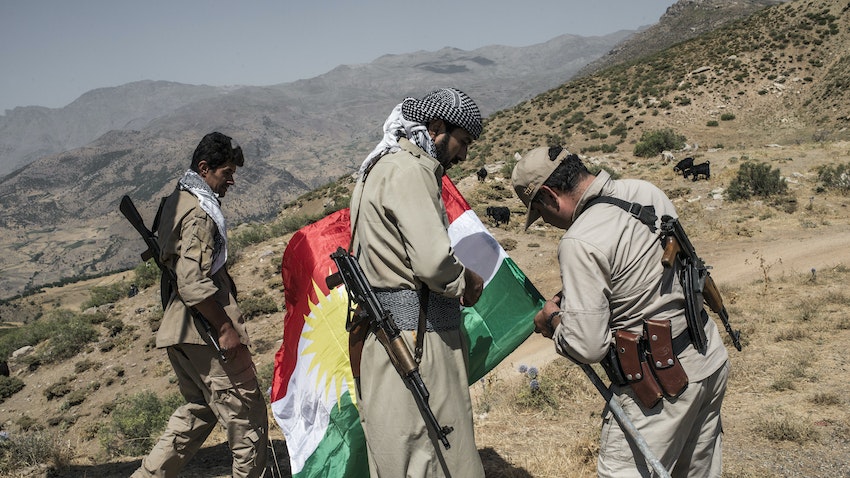Iranian Militias on the Border of Kurdistan
There have been a number of recent reports of the IRGC amassing troops on the border of Iraqi Kurdistan. After weeks of bombarding this region, it looks as though Iran might be preparing for a ground incursion against Kurdish targets.
Why this region in particular, since there doesn’t seem to be an obvious provocation?
Divide and Conquer
Jîna Mahsa Amini, the woman whose death at the hands of Tehrani morality police sparked the current widespread anti-government protests in Iran, was Kurdish.
The main chant of the protests, “زن، زندگى، آزادى” that is, “Women, Life, Liberty,” is thought to be a slogan first coined by Abdullah Ocalan, the imprisoned founded of the PKK. (Kurdistan Workers Party, an armed group fighting a guerrilla war against Turkey since the 1980s)
For decades, the regime in Iran has threatened that should they be overthrown, it would mean the secession of different regions of Iran (such as the Kurdish northwest territory) and a break-up of the Iranian state.
The current protest movement in Iran is remarkable in how united it is—protestors are refusing to be divided along ethnic lines such as “Persian” or “Kurdish”—which makes the dire warnings that the regime is the only thing holding the country together ring hollow.
Though protests are taking place all over Iran, the most heavy-handed crackdowns have been in the Kurdish regions. Across the Iraqi border, Iran has been bombarding the semiautonomous Kurdish region of Iraq, ostensibly to attack terrorists/Kurdish Iranian separatist groups.
Though these opposition groups have unequivocally stated that they do not want secession but a “free and democratic Iran,” it has not stemmed the attacks from the East.
If the Iranian government can convince the general populace that this is a Kurdish problem and not an Iranian one, of terrorism from outside instead of terrorism from within, the protests will lose their momentum.
The Shia Axis
A few days ago, the Arab League held an emergency meeting to condemn Iranian aggression against Iraqi targets. All members condemned the attacks except for one country: Iraq.
While an excellent illustration of irony, why would Iraq abstain from a vote meant to support its territorial integrity?
To answer this question well and thoroughly would necessarily involve wading through the quagmire that is Iraqi politics, the history of Iraqi Kurdistan, and the broader Sunni-Shiite regional jostling for power. I won’t do that here.
Suffice it to say, in Iraq, though it is an Arab nation, Shiites form the majority (about 55-60% of the population). Iraq is “the land of a thousand Hezbollahs,” with Shiite militias controlling vast swaths of federal Iraq and giving access and allegiance to Iran.
Since the Islamic Revolution in the late 1970s and the subsequent brutal Iran-Iraq War, Iraq has been a breeding ground for Iranian proxy forces and a land bridge to Iranian proxy wars in Syria, Lebanon, and Yemen.
Iraqi Kurdistan, on the other hand, has a Sunni majority, has a separate governing body from federal Iraq, and has been a staunch ally of the western world, from the overthrow of Saddam Hussein (genocidal to the Kurdish minority in Iraq) to the repelling of ISIS forces.
While different Iraqi officials have complained that Iran’s recent attacks are “destabilizing,” they are hesitant to condemn Iran on the international stage, considering how enmeshed the two countries are.
This has undoubtedly signaled to Iran that they can attack Iraqi Kurdistan with impunity, with little pushback from federal Iraq and relatively little international outcry. (Turkey has been bombarding Kurdistan from the west for years without making global headlines.)
Kurdistan = Nearby Western Proxy
On September 28, US Forces shot down an Iranian drone headed toward Erbil, the capital of Iraqi Kurdistan. In response, the commander in chief of Iran’s armed forces, Maj. Gen. Mohammed Bagheri said, “If Americans carry out any action against Iranian drones, the armed forces of the Islamic Republic of Iran will respond to their hostile measure.”
He added that Iran had complete and precise knowledge of US Coalition bases in Harir, Erbil, and Duhok. This confrontation is happening within the greater context of the Iran nuclear talks and the public accusation of Ayatollah Ali Khamenei that the US and Israel are behind the nationwide protests.)
Just as Saddam Hussein shot scud missiles at the more readily accessible western ally Israel during the First Gulf War, Kurdistan is a readily available scapegoat for Iranian frustration towards the US and western support of the anti-regime protest movement inside its borders.
Border Control
As the protests in Iran spread and grow, the government is using tried and true methods to tamp down on protesters’ coordination by censorship and even switching off internet access entirely. However, SpaceX CEO Elon Musk activated his firm’s satellite internet service over Iran, known as Starlink.
Using this system to circumvent internet censorship, however, requires equipment. A demand for Starlink modems has led to cross-border smuggling from Iraqi Kurdistan and stoked fears that equipment that could fuel a revolution might reach Iran most easily via Iraqi Kurdistan.
Conclusion
Iran has several good reasons to launch a full-scale assault on Iraqi Kurdistan. By making the current protests a “Kurdish issue,” and not a broader Iranian issue, they can try and break up the inter-ethnic unity that has marked this current protest movement. The Shiite majority in Iraq is already disposed to support Iran over the Sunni Kurds in the north. Kurdistan makes a handy scapegoat for the broader hostility Iran has towards the West. The Iraqi-Kurdistan-Iran border seems the most likely source for counter-revolutionary logistical support and supplies to be smuggled into the country.
Despite the fact that attacking Kurdistan might make “logical sense,” it could spark a much wider regional conflict that would swallow up any hope of reform within Iran.
Obviously, I hope and pray for a much better outcome.
We will continue to monitor the situation.

